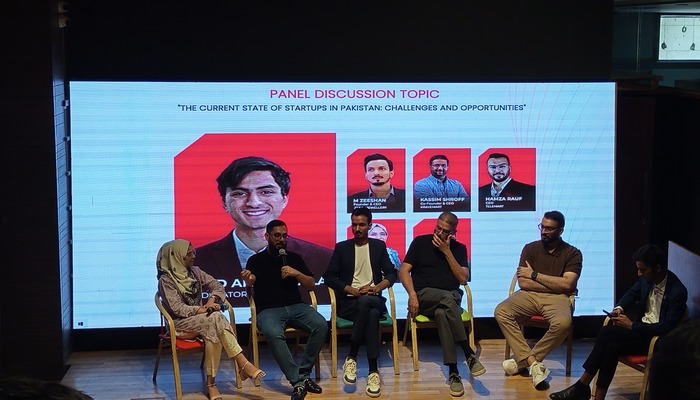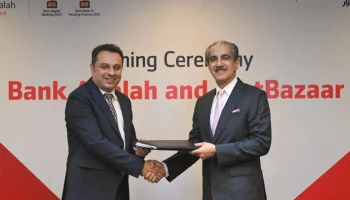
Under prolonged economic stress, rising costs, and an otherwise undeveloped funding ecosystem compared to regional counterparts, Pakistan's startup ecosystem is under greater pressure than ever.
However, in this environment, a determined group of adaptive, collaborative, and cautiously hopeful entrepreneurs are emerging.
At a recent Startup Grind panel discussion, held on Sunday, the founders, investors, and community builders shared how they are sharing and navigating the opportunities and challenges the startup market is facing.
Notably, the discussion started off with the Founder of Trillion Trees and moderator of the panel discussion Saad Allahwala, who provided an introduction to the platform.
Co-Director of Startup Grind Karachi Hadiqua Sheikh then spoke about how the platform is leading and shaping the startup community, which was followed by a brief introduction from the Director of Startup Grind Karachi Umair Arshad who elaborated on the broader vision behind Startup Grind's undertaking.
Startup Grind is a worldwide network established in 2010 focused on helping early-stage entrepreneurs with mentorship, events, and community building opportunities. In Pakistan, its latest initiative is working to fill a critical gap, which could offer founders a sense of belonging in an uncertain environment.
Current landscape of Pakistan’s startup ecosystem
According to the Business Recorder, Pakistan saw a 77% decrease in startup funding in 2024 as compared to 2022, whereas a report by MAGNiTT, a regional startup data platform, noted that early signs in 2025 suggest a recovery could be underway.
From January to March 2022, local Pakistani start-ups raised around $196,000 across three deals.
However, this is an improvement on the payment drought a year before. This shift starts to occur just after the government finishes agreements with the IMF and other multilaterals, and the State Bank of Pakistan decreases the policy rate to provide potential positive outcomes to the economy.
When panelists were asked how they scaled in such a challenging economic landscape, many highlighted that the core issue wasn’t just funding, but a lack of clarity around sustainable models and long-term strategy. Co-Founder of Telemart Hamza Rauf pointed out: “In Pakistan, the startup ecosystem isn’t broke, it’s just misunderstood. People rush into trends without evaluating what truly suits them. If your startup doesn’t have a solid business model or a tested solution, funding won’t save it. We need to stop chasing FOMO and start building sustainably.”
Rauf also mentioned on the panel: "Scaling is not about degrees or shortcuts; it's about building true value for your customers, your stakeholders, and yourself."
For Rauf, the value proposition has to be apparent day one. He warned against complacency, recalling that companies "can't stay stagnant at 1%," and have to go out and take market share where customers already are.
Telemart's business model, he added, was designed to bring a platform of ownership and scale through empowering partners. "Success is a journey together," he added.
Focused on the long-term mindset co-founder and CEO of Krave Mart Kassim Shroff said resilience is psychological as well as strategic: “While the startup hype led many to launch but eventually shut down, we realized early on that real growth comes from creating value — not chasing trends. In a market where e-commerce was just 1%, we didn’t wait for customers to come online, we went to where they already were.”
Shroff acknowledged that challenges, like high fuel prices and shutdowns of internet service happened in Pakistan, so, the challenges must be worked through, and they can, with long term patience and vision: "All of these challenges are real," he said, "but so are the opportunities if you are resilient."
Why do many startups struggle to scale in Pakistan?
Due to a number of factors, such as a volatile macroeconomic environment, uneven infrastructure, and restricted access to capital, scaling remains a significant challenge for startups in Pakistan. Securing follow-on funding is difficult for many early-stage businesses, and some are compelled to accept down rounds that reduce their valuations in order to stay in business.
Panellists provided startling insight when asked why so many seemingly well-funded, recognised startups have failed to grow from one to two locations, let alone from two to four. "99% of startups fail worldwide, not just in Pakistan," added the founder of ZEESY Jewellery M Zeeshan who further added that "mission-based persistence and believing in yourself" are what distinguish survivors.
Zeeshan founded Zeesy by emphasising local manufacturing and developing an original selling proposition, in contrast to many in the jewellery industry who depend on importsand created a unique selling proposition aligned with Pakistani market dynamics.
“Business isn’t an overnight success,” he cautioned, highlighting that longevity comes from years of dedication, experimentation, and continuous strategy refinement.
Collaboration over competition in Pakistan’s startup ecosystem
Within Pakistan's startup community, cooperation is becoming a crucial tactic in a market struck by financial limitations and economic challenges.
To strengthen the ecosystem, many investors and entrepreneurs are promoting partnerships, knowledge sharing, and group growth rather than concentrating only on short-term personal gains.
Co-Founder and COO of Startup Syndicate Urooj Zia responded that professionalism and problem-solving are the reasons why some founders continue to open new branches when the larger story is about contraction. “Success in the short term is an illusion. Whether they admit it or not, the success of a startup is based in solving actual, tactile problems.”
She emphasised that sustainable businesses are built on creative strategy across all functions. “Sales, supply chain, operations, they all have to be creative to differentiate and win.”
As the conversation drew to a close, City Mail’s managing partner Atta Azad urged a broader, collective vision. He argued that short-termism was holding the ecosystem back, stating that “we can’t just be thinking about our own, short-term growth, but what we are building for the next 10 to 20 years.”
According to him, even in an environment full of uncertainty, the startup community must be founded on openness and a readiness to share knowledge. "Despite Pakistan's difficult circumstances, we can achieve successful results if we have a long-term vision and collaborative efforts."
While some startups are changing their models to reflect social impact and climate goals, particularly in areas like clean tech and financial inclusion, others are looking to expand in Global Capability Centres (GCC) markets.
Moreover, the increasing involvement of women in entrepreneurship is one of the main highlights of Q1 2025. The male-to-female founder ratio in funded startups improved to 2:1 for the first time, which is a sign of diversity and representation in a traditionally male-dominated ecosystem.
Panelist throughout the session echoed in a very direct call to understand the sector before diving in, an important lesson many founders miss out on: “If I’ve never worked in retail, how can I be a problem-solver? But if I’ve been in fintech for four to five years, I know all the pain points — and how to solve them," Urooj added.
Zia stresse over that if people recognises themselves that they can solve industrie's one core problem only then they can be a good entrepreneur, “Go and ask any of the senior executives: 'Tell me the one core problem in your field.' You will get a list. Now, ask yourself to pick those which do not need a 100 million rupee license or a huge company."
When the trend and discussion went more towards regional potential, Karachi was highlighed as the hub for opportunities. While addressing this Urooj added: "Karachi — it's like a mother. Whoever comes here — whatever you are who ever you are, finds a way to make something happen. To earn, to survive."
"The level of professionalism in Karachi is like nowhere else in Pakistan. Everybody is trying to be in business," she added.
The conversation throughout the panel discussion made clear how important it is to provide real value, have a long-term vision, and demonstrate constant dedication for startups to succeed in Pakistan. Instead of waiting for the right circumstances, expanding companies need to actively seek out opportunities.
Furthermore, overcoming setbacks requires resilience and faith in one's purpose. Creativity in all areas is necessary for sustainable growth, and strengthening an ecosystem requires a team mentality that sees beyond immediate benefits.
















